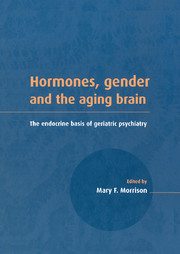Book contents
- Frontmatter
- Contents
- List of contributors
- Preface
- Acknowledgments
- Part I Overview
- Part II Hormones and mental health in the elderly
- 3 The hypothalamic–pituitary–adrenal axis in aging: preclinical and clinical studies
- 4 The hypothalamic–pituitary–thyroid axis
- 5 Estrogen and depression in aging women
- 6 The role of testosterone in male depression
- 7 Dehydroepiandrosterone in aging and mental health
- 8 Sex hormones, cognition, and dementia in the elderly
- 9 Effects of estrogen on basal forebrain cholinergic neurons and cognition: implications for brain aging and dementia in women
- 10 Gender and schizophrenia
- 11 Sex steroids and anxiety disorders
- 12 Gender and hormonal factors in pain and pain inhibition
- Part III Effects of hormones and behavior on immune function
- Part IV Hormones and gender differences in psychotropic drug metabolism
- Index
12 - Gender and hormonal factors in pain and pain inhibition
from Part II - Hormones and mental health in the elderly
Published online by Cambridge University Press: 18 September 2009
- Frontmatter
- Contents
- List of contributors
- Preface
- Acknowledgments
- Part I Overview
- Part II Hormones and mental health in the elderly
- 3 The hypothalamic–pituitary–adrenal axis in aging: preclinical and clinical studies
- 4 The hypothalamic–pituitary–thyroid axis
- 5 Estrogen and depression in aging women
- 6 The role of testosterone in male depression
- 7 Dehydroepiandrosterone in aging and mental health
- 8 Sex hormones, cognition, and dementia in the elderly
- 9 Effects of estrogen on basal forebrain cholinergic neurons and cognition: implications for brain aging and dementia in women
- 10 Gender and schizophrenia
- 11 Sex steroids and anxiety disorders
- 12 Gender and hormonal factors in pain and pain inhibition
- Part III Effects of hormones and behavior on immune function
- Part IV Hormones and gender differences in psychotropic drug metabolism
- Index
Summary
Introduction
Much recent research has focused on differences between the sexes in both physiology and behavior. The idea that differences between men and women can be attributable to biological factors that do not result from rearing or sociocultural variables is intriguing for many reasons, not the least of which is that it can help to explain sex differences in important health-related endpoints. One such endpoint is the experience of pain.
A consideration of the hormonal basis for gender differences in pain perception is relevant to a volume on the neuroendocrine aspects of aging for several reasons. One of the foremost observations of health care practitioners is the enormous degree of individual variability that exists among patients with respect to pain and analgesia. For example, some individuals continue to report pain following substantial doses of morphine (Lasagna & Beecher, 1954), while others exhibit significant pain relief following treatment with placebo (Beecher, 1959). As health care providers face aging populations, in whom chronic pain conditions and painful disease are increasingly prevalent, it is essential to understand the factors that contribute to such variability in order to effectively treat pain. Gender is one such factor.
Furthermore, a likely contributing factor to gender variability in pain experience is hormonal status, as will be discussed later in this chapter. Widespread changes in gonadal hormone levels, particularly in females, are characteristic of the aging process and may play a role in painful experience.
- Type
- Chapter
- Information
- Hormones, Gender and the Aging BrainThe Endocrine Basis of Geriatric Psychiatry, pp. 267 - 286Publisher: Cambridge University PressPrint publication year: 2000



